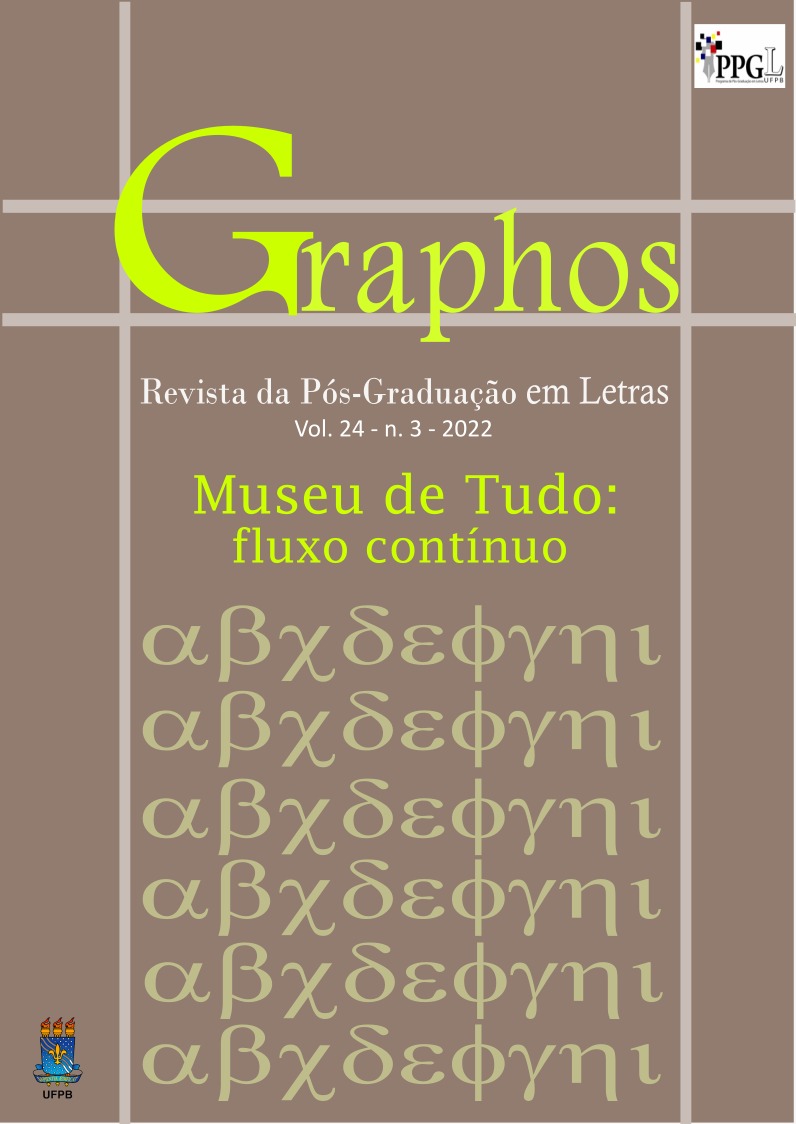Decapitated modernism: the musical reanthropophagy of Arandu Arakuaa
DOI:
https://doi.org/10.22478/ufpb.1516-1536.2022v24n3.64196Keywords:
modernism, decolonial, music, Arandu Arakuaa, anthropophagyAbstract
Beyond the century that separates and links the Brazilian Semana de arte moderna of 1922 to our social period, this article questions the illusory albeit persistent seclusion between the modern, modernism, and modernity, which permeates much of both historiography and cultural studies of the last 100 years, marked by cultural silencing and appropriations of the Indigenous presence in literary and aesthetic-cultural expressions in the context of the Modern Art Week and the anthropophagic movement, and in artistic productions that followed it. Distinct productions are discussed with focus on music as a cultural expression (poetically and historically linked to literature and other arts): textual (José de Alencar, Mário de Andrade, Oswald de Andrade) and musical works (Carlos Gomes, Villa-Lobos); thus, the discussion enters the territory of cultural movements that dialogue with Brazilian modernism, such as Tropicália and other hybrid music genres. Finally, contemporary manifestations of Indigenous authorship in literature, visual arts and music are discussed. These manifestations rescue the Indigenous presence, re-anthropophagizing (as proposed by Denilson Baniwa) modernism, freeing Indigenous art from textual and symbolic limitations, and bringing to light the relation between Indigenous art making and a history of political and epistemological resistance. This articulation is approached in the context of the heavy metal band Arandu Arakuaa, with focus on melody (reappropriating Western musical genres and incorporating local sounds) and discourse (in a decolonial perspective of rescuing and healing of Indigenous episteme).
Downloads
References
ARANDU ARAKUAA. Kó Yby Oré. Brasília: MS Metal Records, 2013.
ARANDU ARAKUAA. Mrã Waze. Brasília: Independente, 2018.
ARANDU ARAKUAA. Wdê Nnãkrda. Brasília: Independente, 2015.
ANDRADE, Mário de. Macunaíma - o herói sem nenhum caráter. São Paulo: Martin Claret, 2016.
ANDRADE, Oswald de. Manifesto antropofágico. In: Obras completas: do pau-brasil à antropofagia e às utopias. Rio de Janeiro: Civilização Brasileira, 1978.
BANIWA, Denilson. Nem modernista, nem anti-modernista, a arte indígena contemporânea (e cosmopolítica) na vanguarda de um Brasil que jamais foi moderno. [Entrevista concedida a] Ricardo Machado. In: Ihu On-Line, n. 55, 2022. Disponível em: https://www.ihuonline.unisinos.br/edicao/551 Acesso em: 17 jul. 2022.
BANIWA, Denilson. Re-Antropofagia, pintura, 2019. Disponível em: https://brooklynrail.org/2021/02/criticspage/ReAntropofagia Acesso em: 10 set. 2022.
BEVILACQUA, Juliana. Agnaldo Manuel dos Santos: A conquista da Modernidade. Almeida & Dale, 2021. Disponível em: https://www.almeidaedale.com.br/pt/exposicoes/agnaldo-manuel-dos-santos-a-conquista-da-modernidade Acesso em: 07 nov. 2022.
BUCCI, Magda. Histórias da Semana: o que é preciso rever. YouTube, 2021. Disponível em: https://www.youtube.com/watch?v=J-E8rfXjqoY&t=10423s Acesso em: 01 ago. 2022.
CAMPOS, Deivison. A questão racial no modernismo brasileiro antes e depois da Semana de arte moderna. [Entrevista concedida a] Ricardo Machado. In: Ihu On-Line, n. 55, 2022. Disponível em: https://www.ihuonline.unisinos.br/edicao/551 Acesso em: 17 jul. 2022.
DINATO, Daniel. ReAntropofagia: a retomada territorial da arte. In: MODOS. Revista de história da arte, v. 3, n. 3, 2019. p. 276-284. Disponível em: https://www.publionline.iar.unicamp.br/index.php/ mod/article/view/4224 Acesso em: 01 set. 2022. DOI: https://doi.org/10.24978/mod.v3i3.4224
ESBELL, Jaider. Makunaima Manifesto: a cosmopolítica da arte indígena contemporânea. Modernismos 1922-2022, São Paulo: Companhia das Letras, 2022.
ESBELL, Jaider. Makunaima, o meu avô em mim! Revista Iluminuras, v. 19, n. 46, 2018. p. 11-39. DOI: https://doi.org/10.22456/1984-1191.85241
HUKU, Zândhio. Arandu Arakuaa mistura heavy metal e música indígena. [Entrevista concedida a] Studio A. 2021. Disponível em: https://www12.senado.leg.br/tv/programas/estudio-a/2021/10/arandu-arakuaa-mistura-heavy-metal-e-musica-indigena Acesso em: 03 set. 2022.
HUKU, Zândhio. Arandu Arakuaa - Conceito da Música Kaburéûasu. YouTube, 2020. Disponível em: https://www.youtube.com/watch?v=3V06v9wgWKY&t Acesso em: 06 nov. 2022.
GALVÃO, Raíssa Varandas. Antropofagia e inversão hierárquica no Abaporu, de Tarsila do Amaral. In: II Seminário de Pesquisas em Artes, Cultura e Linguagens Anais. Universidade Federal de Juiz de Fora, 2015. p. 114-119.
JACQUES, Tatyana de Alencar. O descobrimento do Brasil (1937): Villa- Lobos e Humberto Mauro nas dobras do tempo. Tese (Doutorado em Antropologia Social). Universidade Federal de Santa Catarina, 2014. Disponível em: https://repositorio.ufsc.br/xmlui/handle/123456789/130968 Acesso em: 01 ago. 2022.
JECUPÉ, Kaka Werá. A terra dos mil povos: História indígena brasileira contada por um índio. São Paulo: Petrópolis,1998.
KAHN-HARRIS, Keith. Extreme metal music and culture on the edge. Oxford: Berg, 2007.
KAHN-HARRIS, Keith. 'Roots'?: the relationship between the global and the local within the Extreme Metal scene. Popular music, v. 19, n. 1, 2000. p. 13-30. DOI: https://doi.org/10.1017/S0261143000000052
MOREIRA, G. F. O Estilo indígena de Villa Lobos (Parte I) aspectos melódicos e harmônicos. Per Musi, Belo Horizonte, n. 27, 2013, p.19-28. DOI: https://doi.org/10.1590/S1517-75992013000100003
MUNIZ, Leando; ALZUGARAY, Paula. Entre o fascínio e o terror, o imaginário da onça-pintada tem ressonâncias nas cosmogonias indígenas, na ciência e na literatura. Select, 2021. Disponível em: https://www.select.art.br/a-constelacao-da-onca Acesso em: 06 nov. 2022.
NASCIMENTO, Milton. Txai. Rio de Janeiro: CBS, 1990.
NETO, Arman. ‘Txai’, de Milton Nascimento: um sopro de vida em meio ao ódio. Impressões de Maria, 2020. Disponível em: https://impressoesdemaria.com.br/2020/07/txai-de-milton-nascimento-um-sopro-de-vida-em-meio-ao-odio Acesso em: 01 ago. 2022.
ROSÁRIO, Fernanda. Abdias Nascimento questionou arte da Europa e reivindicou modernismo negro. Alma Preta, 2021. Disponível em: https://almapreta.com/sessao/cultura/abdias-nascimento-trouxe-para-o-teatro-a-dimensao-politica-e-de-resistencia-negra Acesso em: 05 nov. 2022.
SEGAWA, Hugo. Arquiteturas no Brasil 1900-1990. São Paulo: EdUSP, 2002.
SILVA, Flávio Garcia da. ‘Itsári’, roots, raízes: um estudo de caso sobre o disco Roots da banda Sepultura. Dissertação (Mestrado em Música). Universidade Federal de Minas Gerais, 2019. Disponível em: https://repositorio.ufmg.br/handle/1843/30427 Acesso em: 01 jul. 2022.
SIMIONI, Ana Paula Cavalcanti. Mulheres modernistas: estratégias de consagração na arte brasileira. São Paulo: EdUSP, 2022.
STERZI, Eduardo. Semana de 22: juntar as ruínas do passado e reconstruir o inimaginável moto modernista contra o mito fundador. [Entrevista concedida a] Ricardo Machado. In: Ihu On-Line, n. 55, 2022. Disponível em: https://www.ihuonline.unisinos.br/edicao/551 Acesso em: 17 jul. 2022.
TRAVASSOS, Elizabeth. Modernismo e música brasileira. Rio de Janeiro: Jorge Zahar, 2000.
VOLPE, M. A. Remaking the Brazilian myth of national foundation: Il Guarany. Latin american music review, v. 23, n. 2, 2002. DOI: https://doi.org/10.1353/lat.2002.0019
Downloads
Published
Issue
Section
License
Copyright (c) 2023 Fabio Coura, Claudia Lima

This work is licensed under a Creative Commons Attribution 4.0 International License.







